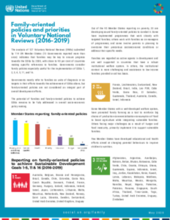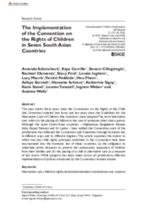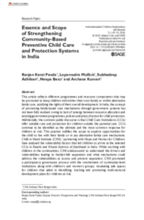Displaying 211 - 220 of 1796
This paper provides a summary of laws, policies, and programs pertaining to stepfamilies in a selection of Western countries, with a special focus on the United States.
The author argues that early childhood education interventions for OVC should be a priority of government since quality education and care programs in the early years can enhance the possibility of breaking the cycle of inequity in the lives of OVC and positively contribute to the economy of the country.
This analysis of 127 Voluntary National Reviews (VNRs) submitted by 114 UN Member States (13 Governments reported more than once) indicates that families may be key to ensure progress towards the SDGs by 2030, with close to 90 per cent of countries making specific references to families.
This study sought to determine the needs of the general population of children in Botswana.
This study aimed to determine the approach to child welfare in Iran by reviewing Iran’s laws and macro policies, and analysing them to provide an explicit and comprehensive definition for child welfare.
This book examines how child protection law has been shaped by the transition to late modernity and how it copes with the ever-changing concept of risk.
In this interview, Andy Bilson - Emeritus Professor at the University of Central Lancashire, Associate Director of The Centre for Children and Young People’s Participation, and researcher promoting children’s rights and reform of child protection systems - discusses the trends in children's care and protection in the UK and globally over the past few decades.
This article examines the extent to which two key child rights principles enshrined in the Convention have been incorporated into the domestic law of seven South Asian countries: (a) the obligation to undertake active measures to prevent the unnecessary separation of children from their families and (b) the placing of a child in alternative care as a measure of last resort.
This article reflects different programmes and resource components that may be promoted to keep children with either their own family or within alternative family care, satisfying the rights of their overall development.
This country care review includes the Concluding Observations of the Committee on the Rights of the Child.






